
Software quality assurance strategies and techniques are crucial for ensuring the reliability of your software. Learn what they are and how to implement them effectively for a seamless user experience.


The saying goes that “prevention is better than cure,” and this idea holds great significance in the realm of software quality assurance.
As professionals in the software industry, we understand the critical importance of implementing robust SQA strategies and techniques.
From defining SQA activities to implementing testing and inspection methods, there's a wealth of knowledge to explore in this vast field.
So, let's uncover the key elements of SQA and how they contribute to the success of software development.
Understanding Software Quality Assurance is essential for ensuring the alignment of software products with specified requirements and achieving high standards of quality management.
Software Quality Assurance (SQA) encompasses a comprehensive approach to the entire software development process. It involves the implementation of standards, procedures, and guidelines to ensure that the software meets the desired quality attributes.
SQA isn't limited to testing; it also involves the establishment of software quality metrics, which are essential for measuring the effectiveness of the SQA activities.
The primary goal of SQA is to verify the implementation of procedures and processes, catch product shortcomings before public release, and ensure that software products meet quality specifications.
SQA standards such as ISO 9000, CMMI, and TMMi focus on achieving quality management principles and process improvement, thereby ensuring that the software development process is aligned with industry best practices.
AdvertisementSQA techniques, including auditing, reviewing, code inspection, design inspection, testing, static analysis, and walkthroughs, play a crucial role in identifying and rectifying defects at various stages of the software development life cycle.

Key SQA activities encompass a range of essential tasks and processes that ensure the alignment of software products with specified requirements and the achievement of high standards of quality management.
The SQA team is responsible for developing and implementing software quality assurance strategies and techniques to ensure that the software engineering processes meet the required quality standards. This involves employing various testing strategies to find bugs and defects, utilizing automated tools for efficient testing, and establishing Quality Assurance and Quality Control processes.
Additionally, the SQA team is responsible for creating an SQA Management Plan to guide the SQA activities throughout the project, setting checkpoints to evaluate project performance, quality, and progress, and maintaining records and reports of executed test cases and logged defects.
Furthermore, nurturing good relations between the testing and development teams is vital for effective project delivery.
AdvertisementThese key SQA activities are crucial for ensuring the overall quality and reliability of software products, and they require a dedicated and skilled technical staff to execute them effectively.
Implementing SQA techniques involves a comprehensive approach, encompassing auditing, reviewing, code inspection, design inspection, and simulation.
SQA techniques also include static analysis, walkthroughs, unit testing, stress testing, and functional testing.
The Software Quality Assurance Plan (SQAP) plays a crucial role in identifying responsibilities, work products, areas for reviewing, and auditing in SQA implementation.
AdvertisementCode inspection and functional testing are essential SQA techniques for ensuring the product aligns with requirements.
Activities involved in SQA implementation encompass setting checkpoints, participating in requirement gathering, conducting technical reviews, and formulating a multi-testing strategy.
SQA team members, including quality assurance professionals, are instrumental in executing these activities to ensure the project's success.
The integration of Software Testing and Assurance and Quality Control into the implementation of SQA techniques is pivotal for delivering a high-quality product.
Therefore, a collaborative effort from the SQA team is essential for the effective implementation of these techniques to guarantee the quality of the product.
Advertisement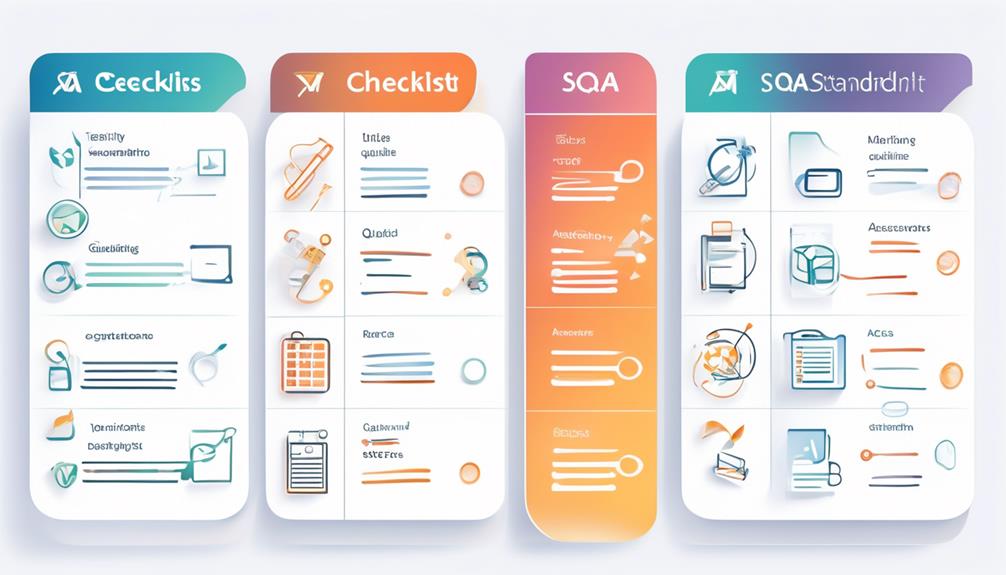
SQA Standards and Elements encompass specific criteria and components that are essential for ensuring the quality of software. These standards and elements play a crucial role in the software development processes, ensuring that the end product meets the required quality standards.
These elements, along with adherence to SQA standards such as ISO 9000, CMMI level, and TMMi, form the foundation of effective Quality Assurance in software development.
The advantages of Software Quality Assurance (SQA) become evident through its ability to increase client confidence, save costs, and promote productivity and efficiency in software development processes. SQA ensures that the software works as expected, leading to good time estimation and project planning. By integrating SQA into the development life cycle, engineering activities are streamlined, resulting in higher quality software. Automation testing in SQA prevents the occurrence of unforeseen emergencies by detecting defects early, saving time and costs in the long run.
To illustrate the advantages of SQA, let's look at the following table:
Advertisement| Advantages of SQA | Description |
|---|---|
| Increased Client Confidence | Proper quality check increases client's confidence in timely work submission. |
| Cost Savings | Early defect detection and resolution saves money in fixing faulty software. |
| Customer Satisfaction | Timely involvement of clients in development and testing boosts satisfaction. |
| Productivity and Efficiency | Early defect detection allows for more productive work. |
The best technique applied to software quality assurance is a combination of auditing, reviewing, code inspection, design inspection, and simulation. These techniques ensure comprehensive coverage of the software product, validating its functionality and alignment with requirements.
Our SQA strategy focuses on thorough testing, code inspection, and continuous improvement. We prioritize early detection of defects and use a multi-tiered testing approach to ensure comprehensive coverage.
Our goal is to deliver high-quality software products by implementing a robust SQA plan, including specific QA and QC tasks, technical reviews, and testing methodologies. This approach enhances trust in our products and reduces the need for constant patches, ultimately saving time and money.
AdvertisementOur software quality assurance strategy focuses on ensuring product alignment with requirements through procedures, techniques, and tools.
We create an SQA Management Plan, set checkpoints, and formulate a multi-testing strategy.
Our techniques include auditing, reviewing, code inspection, design inspection, and simulation.
We also validate system functionality and meet requirements through functional testing, and use simulation for virtual examination of the system.
AdvertisementThis strategy ensures software products meet quality specifications and works parallel to software development throughout the life cycle.
The 4 types of quality assurance encompass internal, external, regulatory, and customer-oriented aspects. Each plays a vital role in ensuring consistent quality and compliance with standards.
Internal QA focuses on in-house processes, while external QA involves independent evaluation. Regulatory QA ensures adherence to industry regulations, and customer-oriented QA centers on meeting and exceeding customer expectations.
These varied approaches collectively contribute to maintaining high-quality products and services.
AdvertisementIn conclusion, software quality assurance (SQA) strategies and techniques are crucial for ensuring the quality and reliability of software products.
Did you know that implementing SQA practices can lead to a 25% reduction in software defects?
By using techniques like code inspection and stress testing, SQA helps to identify and prevent issues before they impact end users, ultimately leading to higher customer satisfaction and better overall efficiency.
Advertisement
Rick, our Software Quality Assurance Writer, is the creative force behind many of our insightful articles and course materials. His unique background in software development, fused with his natural flair for writing, allows him to convey complex QA concepts in a way that is both informative and captivating. Rick is committed to keeping abreast of the latest trends and advancements in software testing, ensuring that our content remains not just relevant, but at the forefront of the field. His significant contributions are instrumental in helping us fulfill our mission to deliver premier QA education.
Integrating Software Quality Assurance Throughout the Development Life Cycle: A Strategic Approach
What Is Your Understanding of Quality Assurance in Software Development

Rick, our Software Quality Assurance Writer, is the creative force behind many of our insightful articles and course materials. His unique background in software development, fused with his natural flair for writing, allows him to convey complex QA concepts in a way that is both informative and captivating. Rick is committed to keeping abreast of the latest trends and advancements in software testing, ensuring that our content remains not just relevant, but at the forefront of the field. His significant contributions are instrumental in helping us fulfill our mission to deliver premier QA education.
Continue Reading
Advertisement
Software Quality Assurance ensures that software products and processes meet quality standards. It involves testing, identifying defects, and ensuring compliance with requirements to deliver high-quality, reliable software products.


We create and implement software testing strategies, pinpoint and document software defects, and investigate issues related to program functionality.
But have you ever wondered about the broader impact of Software Quality Assurance (SQA) on the software development lifecycle?
How does SQA ensure that the end product meets the desired quality standards?
In this discussion, we'll explore the key responsibilities of SQA professionals, their role in ensuring high-quality software products, and the impact of their work on the reliability and user-friendliness of software applications.
As SQA professionals, we diligently execute software test plans to ensure strict adherence to quality standards, consistently identifying and documenting software problems and defects for timely resolution.
Our role involves designing comprehensive test plans, scenarios, scripts, and procedures to cover various aspects of software functionality. We analyze and document problems with program function, prioritizing and addressing software defects to enhance the overall product quality.
We also play a crucial role in providing input on functional requirements and potential problems to improve the software development process. Our responsibilities extend to conducting regression testing to ensure that new developments don't adversely impact existing functionalities.
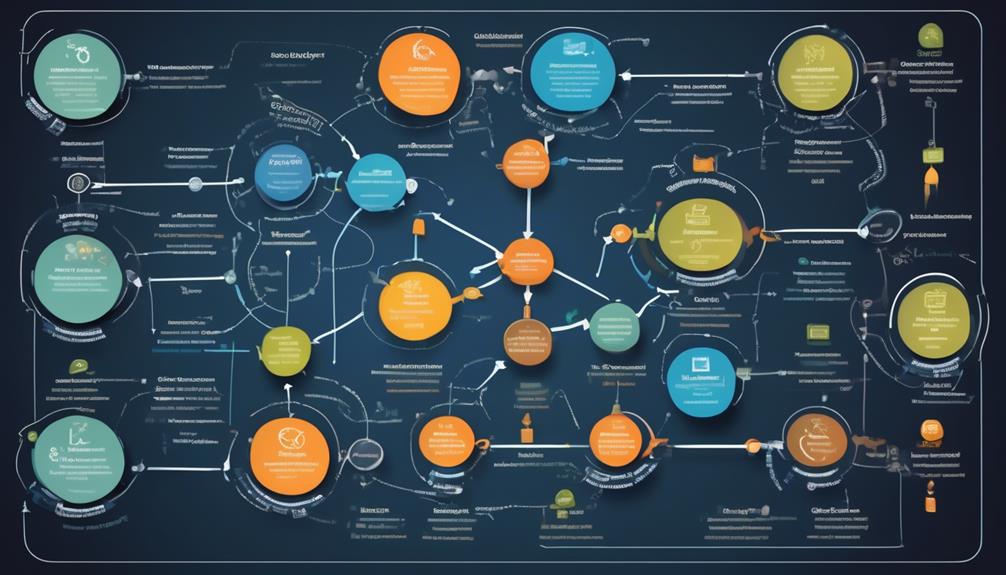
Playing a crucial role in ensuring software products meet quality specifications, SQA professionals impact the entire software development lifecycle by verifying implementation of procedures and catching product shortcomings before public release.
This ensures that the software development process is efficient and that high-quality products are released to the public.
AdvertisementSQA engineers test and validate the software at every stage, ensuring that it meets the required quality standards. They also implement quality control measures, using techniques such as auditing, reviewing, code inspection, and simulation to enhance the overall efficiency and productivity in the development process.
Additionally, SQA's focus on preventing breakdowns, disruptions, and security breaches saves time and money, thereby influencing the maintenance, support, and deployment stages of the software development lifecycle.
Moreover, their emphasis on continuous improvement and collaboration with cross-functional teams impacts the feedback, iteration, and improvement stages of the software development lifecycle, ensuring that the software meets the evolving needs and expectations of the end-users.
In our quest for ensuring high-quality software products, we diligently develop and execute software test plans to guarantee the functionality and reliability of our products. As Software Quality Assurance (SQA) professionals, we focus on meticulous testing, identification, and documentation of software defects to ensure that the final product meets the highest quality standards. We actively engage in code reviews, working closely with software engineers and testing engineers to address potential problems and enhance the overall quality of the software. Our role extends beyond mere testing, as we provide crucial input on functional requirements and collaborate with cross-functional teams to ensure that every aspect of the software aligns with quality standards and industry regulations.
AdvertisementTo emphasize the significance of our efforts in ensuring high-quality software, we can refer to the following table:
| SQA Activities | Description |
|---|---|
| Software Test Planning | Development and execution of comprehensive test plans to ensure functionality |
| Defect Identification | Meticulous analysis and documentation of software defects for improvement |
| Collaboration | Providing input on functional requirements and collaborating with teams |

To uncover the real function of Software Quality Assurance (SQA), we systematically examine the activities and processes that ensure software products meet quality specifications and adhere to established procedures.
SQA, performed by Quality Assurance Engineers and Assurance Analysts within software companies, involves various crucial tasks. These include providing input to Technical Reviews, diagnosing problems in software, ensuring that testing is comprehensive, and assuring the overall quality of the software.
One of the essential functions of SQA is change management, which involves overseeing the process of implementing changes in the software and ensuring that these changes don't compromise the quality of the product.
AdvertisementBy emphasizing these functions, SQA ensures that software companies can produce high-quality products that meet customer needs and expectations.
Additionally, SQA professionals play a critical role in uncovering and documenting software defects, which is essential for maintaining the integrity and reliability of software products.
Through their meticulous attention to detail and methodical approach, SQA professionals contribute significantly to the overall success and trustworthiness of software products.
The role of software quality assurance is crucial in ensuring higher quality software products. We develop and execute software test plans, collaborating with developers and stakeholders to identify defects and provide input on functional requirements.
AdvertisementOur work reduces the need for constant patches and upgrades, increasing customer satisfaction and trust. Additionally, we address cybersecurity vulnerabilities, protect customers from data breaches, and adhere to industry standards for data security and privacy.
Our efforts result in improved software quality and customer satisfaction.
We develop and execute software test plans, identify and document problems, and design comprehensive test plans to verify software implementation. Our analysis of program function provides input on functional requirements and potential problems.
Additionally, we develop testing programs, techniques, and methodologies to ensure software quality, security, and compliance with industry standards. This attention to detail and methodical approach ensures the mastery of software quality assurance.
AdvertisementIn QA roles and responsibilities, we develop and execute test plans to ensure software quality and functionality. We identify and document defects, collaborate with stakeholders, and create automated test scripts.
Our responsibilities include conducting regression and performance testing to ensure software stability and responsiveness. Ultimately, our focus is on ensuring software products meet high standards of quality and functionality, contributing to improved customer satisfaction and market share.
We ensure software quality by:
AdvertisementThis enhances the development process and ensures product safety. Our attention to detail and methodical approach ensures software functionality and overall quality.
In conclusion, software quality assurance professionals play a crucial role in ensuring the high quality and reliability of software products.
Their attention to detail and methodical approach help uncover potential defects and problems before public release, leading to more user-friendly and efficient software.
Like a well-oiled machine, SQA professionals work tirelessly to ensure that software meets the desired quality standards, ultimately leading to satisfied customers and a successful development process.
Advertisement
Rick, our Software Quality Assurance Writer, is the creative force behind many of our insightful articles and course materials. His unique background in software development, fused with his natural flair for writing, allows him to convey complex QA concepts in a way that is both informative and captivating. Rick is committed to keeping abreast of the latest trends and advancements in software testing, ensuring that our content remains not just relevant, but at the forefront of the field. His significant contributions are instrumental in helping us fulfill our mission to deliver premier QA education.
Interested in becoming a Software Quality Assurance Analyst? Learn the essential steps to kickstart your career in software testing and quality assurance.


As you navigate the complex world of technology, picture yourself as the vigilant protector of digital integrity, carefully examining each line of code to identify any possible flaws.
But how does one embark on this journey to become a Software Quality Assurance Analyst, you may wonder? Well, the path is not without its challenges, but with the right guidance and determination, it is entirely achievable.
From the essential educational requirements to the intricate web of certifications and skills, the roadmap to this career is both fascinating and complex.
As Software Quality Assurance Analysts, we rigorously test software to identify and rectify bugs, ensuring a seamless user experience. Our role involves documenting and reporting bugs to software development teams, compiling databases of reports and software issues, conducting research, and preparing testing plans.
AdvertisementWe're responsible for making recommendations for product improvements, ensuring that the software meets the highest quality standards. Quality assurance analysts play a crucial role in the development process, as we're the final gatekeepers before the software is released to the end-users. Our jobs require a meticulous attention to detail, methodical testing methods, and an analytical mindset to uncover even the most elusive bugs.
A career as a software quality assurance analyst typically requires a degree in computer science or a related field, as well as a deep understanding of software development and testing methodologies. With the increasing emphasis on delivering flawless software, quality assurance analyst jobs are in high demand, making it a rewarding and promising career choice for those with a passion for ensuring top-notch software quality.
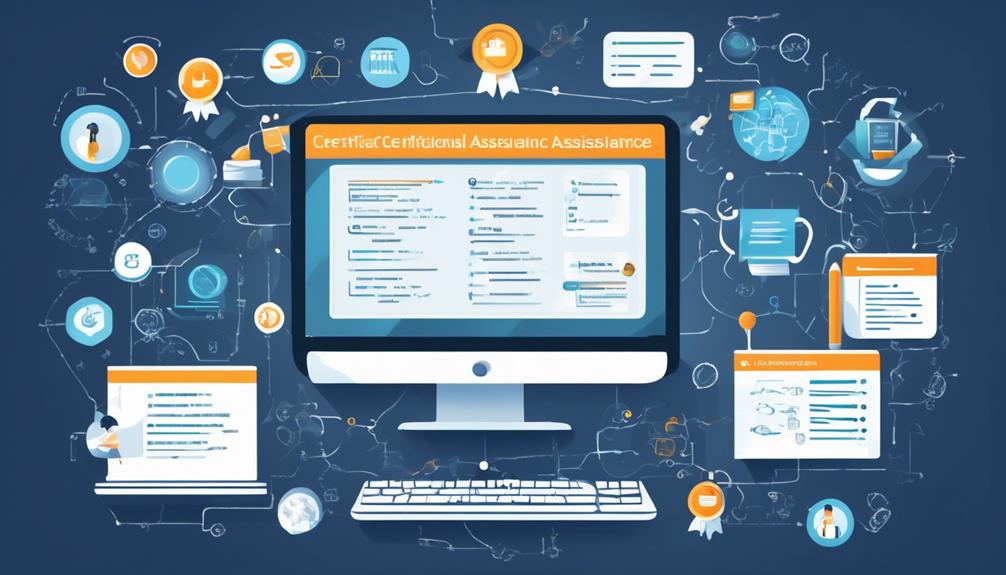
Moving from the discussion of job responsibilities to the educational requirements and certifications for QA analysts, a strong foundation in a technological field, typically with a bachelor's degree, serves as the entry point for this career path. For more advanced roles, pursuing a Master of Science in Data Analytics can be beneficial. Additionally, ongoing education is crucial to stay up to date in this rapidly evolving field. Obtaining additional quality assurance certifications is recommended and can significantly enhance job prospects. Some valuable certifications include Data Analyst and Nanodegree from Udacity, CompTIA A+, CompTIA Network+, and CompTIA Project+. Having one or two of these certifications can boost knowledge and make a candidate more appealing to employers. Below is a comparison table of some relevant certifications:
| Certification | Provider |
|---|---|
| Data Analyst | Udacity |
| Nanodegree | Udacity |
| CompTIA A+ | CompTIA |
| CompTIA Network+ | CompTIA |
| CompTIA Project+ | CompTIA |
Mastering essential skills is crucial for success as a software quality assurance analyst, requiring a methodical approach and keen attention to detail. As professionals working in quality assurance, we must develop a strong analytical mindset and attention to detail to identify software issues and propose effective solutions.
AdvertisementAdditionally, we need to acquire a deep understanding of testing methodologies and tools, along with technical expertise in programming and software development processes. Effective communication skills are also essential for successful collaboration with cross-functional teams, programmers, and developers during and after the testing process.
Education and certifications, such as a bachelor's degree in computer science or engineering, and QA software testing certification, are valuable assets that can help advance our QA career. It's also crucial to stay updated on industry trends and best practices to contribute to efficient planning and resource allocation, ensuring compliance with industry standards.
According to the Bureau of Labor Statistics, the median annual salary for quality assurance analysts is approximately $92,270, making it imperative for us to continuously enhance our skills to excel in this dynamic field.
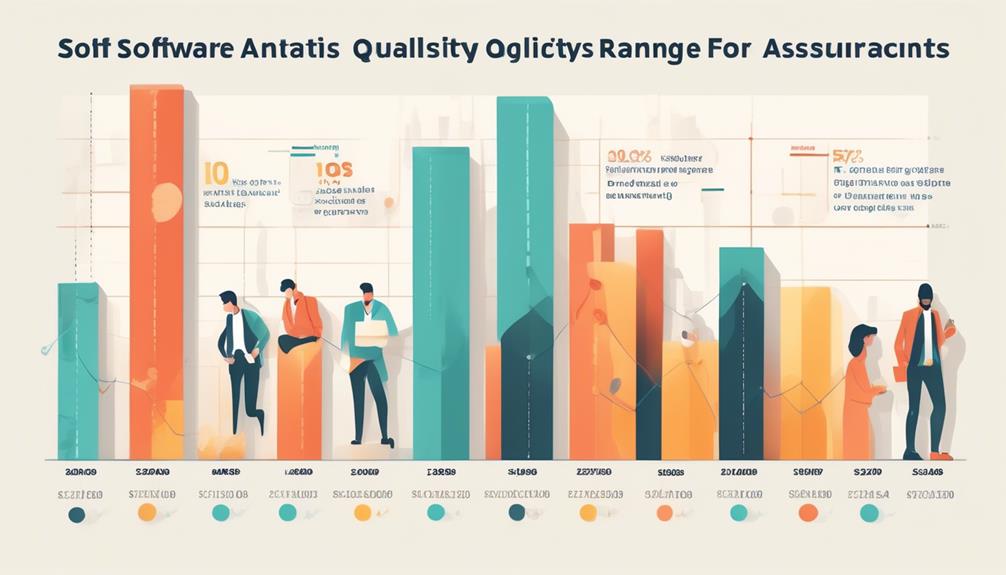
Ensuring our proficiency in essential skills sets the foundation for understanding the significant salary and job outlook for quality assurance analysts.
Quality assurance (QA) analysts play a crucial role in the software development process, ensuring the quality and functionality of the end product. With a bachelor's degree and proficiency in essential skills, QA analysts can expect a competitive average salary. In the US, the median annual salary for QA analysts is $124,200, making it an attractive career choice.
AdvertisementFurthermore, the job outlook for QA analysts is exceptionally promising, with an expected 25% growth from 2022 to 2032, leading to the creation of 451,200 new jobs. This high demand for QA analysts spans across various industries, offering ample opportunities for career growth and advancement.
The demand for individuals with expertise in quality assurance is driven by the increasing reliance on technology and the continuous development of software-driven systems. As QA analysts, we're well-positioned to capitalize on these opportunities, given our crucial role in ensuring the quality and success of software products.
In our pursuit of career growth and development as quality assurance analysts, it's essential to continually seek ongoing education and training to stay abreast of industry trends and advancements. This ensures that we remain competitive and proficient in the ever-evolving tech industry.
To facilitate this, we can pursue relevant skills and knowledge to enhance our appeal as a candidate. Gaining experience in the testing process and quality control of software products is crucial for career advancement. Additionally, obtaining additional quality assurance certifications can significantly enhance our job prospects and desirability in the field.
AdvertisementNetworking with professionals in the industry can provide valuable guidance and potential career opportunities. Furthermore, considering degree programs tailored to prepare individuals for a career as a QA analyst and exploring various learning opportunities in the field can provide a solid foundation for long-term career growth.
We start a career in software quality assurance by obtaining a relevant bachelor's degree and gaining experience in quality control. Pursuing certifications like Data Analyst or CompTIA A+ and staying updated on industry trends through ongoing education and networking with professionals are crucial.
Considering degree programs and exploring opportunities to learn more about the field will help in gaining relevant skills and knowledge.
We start a career as a QA analyst by obtaining a relevant bachelor's degree.
Gaining practical experience through internships or entry-level positions is important.
Pursuing additional certifications to enhance qualifications can also be beneficial.
Staying updated on industry trends and networking with professionals are crucial.
Exploring degree programs like Data Analytics and considering a graduate degree for senior roles can further prepare us.
AdvertisementIt's essential to be methodical, analytical, and detail-oriented in pursuing this career path.
It typically takes two to four years to become a QA analyst, depending on the educational path and individual pace.
Our team suggests pursuing a bachelor's degree in a technological field and obtaining quality assurance certifications to enhance candidacy.
Staying updated on industry trends and advancements is crucial.
AdvertisementOur experience shows that dedication and ongoing learning significantly contribute to becoming a successful QA analyst.
Our meticulous approach and attention to detail help us uncover bugs and ensure the software functions as intended. Our analytical skills and critical thinking are essential for success in this role.
In the world of software quality assurance, we're the gatekeepers of excellence, ensuring that every line of code meets the highest standards.
AdvertisementJust as we meticulously test and analyze software, we must also approach our own career path with the same attention to detail and methodical mindset.
By staying updated and continuously improving our skills, we can unlock the doors to endless opportunities and growth in this dynamic field.

Rick, our Software Quality Assurance Writer, is the creative force behind many of our insightful articles and course materials. His unique background in software development, fused with his natural flair for writing, allows him to convey complex QA concepts in a way that is both informative and captivating. Rick is committed to keeping abreast of the latest trends and advancements in software testing, ensuring that our content remains not just relevant, but at the forefront of the field. His significant contributions are instrumental in helping us fulfill our mission to deliver premier QA education.
Looking to become a quality assurance software tester? Learn about the salary and how to break into the field with our comprehensive guide.


In navigating the intersection of software testing and job satisfaction, pursuing a career as a quality assurance software tester offers numerous chances for growth and development.
But how does one navigate this niche yet necessary career field?
From educational pursuits to practical experience, the journey to a quality assurance software tester salary is multifaceted and ripe with potential.
So, what are the crucial steps and considerations that pave the way to a rewarding and remunerative career in QA testing?
When considering the education requirements for QA Testers, it's essential to prioritize obtaining a minimum of an associate degree, while aiming for a bachelor's degree for enhanced qualifications in the field. A degree in computer science, engineering, or mathematics provides a solid foundation for a successful career in software quality assurance and testing. These fields offer courses that cover essential topics such as Testing and Automation, which are integral to a Tester's career path. Pursuing a degree in one of these areas equips individuals with the necessary analytical and problem-solving skills required in the industry.
Additionally, it's crucial to research and choose accredited institutions that offer relevant programs in Software Testing and Quality Assurance. Networking with classmates and instructors during the educational journey is equally important as it can lead to future employment and collaboration opportunities. Furthermore, gaining practical experience through internships while pursuing the degree can significantly enhance the understanding of industry practices and requirements.
Therefore, a focused approach towards obtaining the right educational qualifications is vital for individuals aspiring to excel as QA Testers in the competitive field of software quality assurance.

Transitioning from the educational requirements for QA Testers, gaining practical experience through internships provides a valuable opportunity to apply industry-specific skills and expand professional connections.
When seeking internships, it's essential to target relevant industries to gain hands-on experience in software testing. Applying for internships with employers in the field of software testing allows individuals to immerse themselves in the Software Development Lifecycle, execute test cases, and gain exposure to the development process.
AdvertisementAdditionally, considering both paid and unpaid internship opportunities can be beneficial, as the focus should be on building skills and networking within the industry. Leveraging internships not only offers the chance to expand professional connections but also enhances resumes, demonstrating industry-specific skills to potential employers.
Furthermore, utilizing internships to gain experience in remote work settings can provide valuable insight into the evolving landscape of the industry, preparing individuals to excel as Quality Assurance Analysts or QA Engineers with a deep understanding of testing procedures.
To maximize the chances of securing a position as a QA Tester, it's essential to tailor your resume and cover letter to emphasize your relevant skills and experience in software testing and quality assurance.
Highlight your proficiency in conducting manual and automated tests, identifying bugs, and collaborating effectively with developers and stakeholders. Emphasize your attention to detail, problem-solving skills, and knowledge of various QA testing types, such as unit testing and integration testing. Communicate your understanding of quality control and the software development life cycle, as well as your ability to perform acceptance testing (UAT).
AdvertisementNetworking with industry professionals and considering internships can provide practical experience and expand your professional network. Research and apply to job openings in industries of interest, considering location, salary, and benefits to find the best fit for your career.
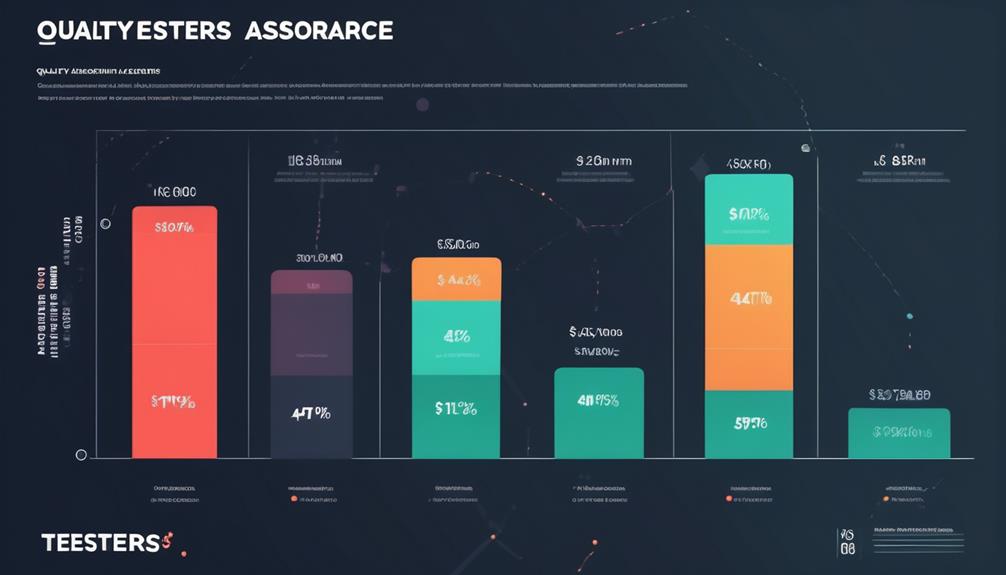
The average annual wage for QA testers in the US is approximately $72,662, encompassing base salary and additional pay. Salaries for Test Engineers in the quality assurance (QA) field vary based on education, experience, location, and industry.
Understanding these factors can provide valuable insights into the average salaries for QA testers and guide professionals in this field toward career advancement and competitive compensation.
Exercising keen attention to detail and employing effective communication are vital traits for QA testers to ensure overall productivity, performance, and client satisfaction in software testing.
AdvertisementA deep understanding of how software functions and the ability to work closely with Software Developers is essential. Whether you hold a bachelor's degree in computer science or an associate degree, the ability to identify errors and communicate them clearly is crucial.
QA Testers must possess strong problem-solving skills to identify the source of issues and develop effective solutions. Deductive reasoning and logical thinking are also essential when using factual statements or evidence to form conclusions about the software's performance.
Time management is imperative as QA Testers often work under strict deadlines and need to plan and allocate time effectively.
Furthermore, with the increasing use of mobile devices, QA Testers must be adaptable and have a broad understanding of various platforms and devices to ensure the software's quality across different environments.
We become software quality assurance testers by pursuing a degree in computer science or a related field, seeking internships for practical experience, and tailoring our resumes to match industry interests.
Salaries vary based on education, experience, and industry, with security software testers generally earning more.
Skills like attention to detail, effective communication, and problem-solving are crucial for excelling in this role.
We've found that the national average salary for software QA testers in the United States is $53,688 per year. However, this figure can vary based on education, experience, location, and industry.
AdvertisementIt's also worth noting that security software QA testers generally earn more than video game QA testers. Additionally, QA testers may receive additional pay such as commissions, profit sharing, or bonuses, contributing to an average total yearly wage of $72,662.
Becoming a QA software tester typically takes between two to four years, as it involves at least an associate degree, with a bachelor's degree being recommended.
Majoring in computer science, engineering, or math, and networking with classmates and instructors can be beneficial.
Gaining qualifications and experience through internships is essential. Building resumes, trying out skills in a specific industry, and expanding professional networks can all improve future employment opportunities.
AdvertisementWe need at least an associate degree, with a bachelor's degree being recommended for a career as a QA tester.
It's crucial to research accredited institutions offering relevant qualifications in computer science, engineering, or math.
Networking with classmates and instructors is important for future employment and collaboration opportunities.
Gaining qualifications and experience through internships will help build a strong foundation for a career in QA testing.
AdvertisementIn conclusion, becoming a quality assurance software tester requires dedication and hard work, much like tending to a delicate garden.
With the right education, internships, and job search strategies, one can pave the way for a successful career in this field.
It's important to stay informed about average salaries and benefits, as well as to cultivate the essential traits needed for this role.
With determination and attention to detail, the path to becoming a quality assurance software tester is within reach.
Advertisement
Rick, our Software Quality Assurance Writer, is the creative force behind many of our insightful articles and course materials. His unique background in software development, fused with his natural flair for writing, allows him to convey complex QA concepts in a way that is both informative and captivating. Rick is committed to keeping abreast of the latest trends and advancements in software testing, ensuring that our content remains not just relevant, but at the forefront of the field. His significant contributions are instrumental in helping us fulfill our mission to deliver premier QA education.